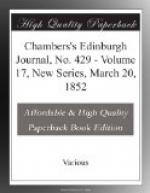——’the air is quick there,
Piercing and sharpens well
the stomach.’
As to Burns, his most fervent admirer can scarcely complain when we involve him in the censure to which we have already subjected Horace and Shakspeare. He, too, writes about the sea in such a fashion, that we should hardly have suspected, what is true, that he was born almost within hearing of its waves; that much of his life was passed on its shores or near them, and that at a time of life when external objects most vividly impress themselves on the senses, and exercise the largest influence on the taste.
The genius of ‘Old Coila,’ in sketching the poet’s early life, says—
’I saw thee seek the
sounding shore,
Delighted with the dashing
roar;’
but few tokens of this ‘delight’ are to be observed in his poetry. He has, indeed, his allusions to ‘tumbling billows’ and ‘surging foam;’ to southern climes where ‘wild-meeting oceans boil;’ to ’life’s rough ocean’ and ‘life’s stormy main;’ to ‘hard-blowing gales;’ to the ‘raging sea,’ ‘raging billows,’ ‘boundless oceans roaring wide,’ and the like; but these are the stock-metaphors of every poet, and would be familiar to him even had he never overpassed the frontiers of Bohemia.
One sea-picture, and one alone, is to be found in Burns, and this, it is freely admitted, is exquisite:
’Behold the hour, the
boat arrive;
Thou goest, thou
darling of my heart!
Severed from thee, can I survive?
But fate has willed,
and we must part.
I’ll often greet this
surging swell,
Yon distant isle
will often hail:
E’en here I took the
last farewell;
There latest marked
her vanished sail.
Along the solitary shore,
While flitting
sea-fowl round me cry,
Across the rolling, dashing
roar,
I’ll westward
turn my wistful eye:
Happy thou Indian grove, I’ll
say,
Where now my Nancy’s
path may be!
While through thy sweets she
loves to stray,
Oh! tell me, does
she muse on me?’
This charming lyric, the pathetic tenderness of which commends it to every feeling heart, is all that Burns has left in evidence that the sea had to him, at least, one poetic aspect.
CURIOSITIES OF CHESS.
More has perhaps been written about chess-playing than any other of the games which human ingenuity has invented for recreative purposes, and it is not easy to foresee the time when dissertation or discovery on the subject shall be brought to a satisfactory conclusion. Scarcely a year passes that does not add something to our knowledge of the history of the royal game; and among the latest additions, the able paper by Mr Bland, published in the Journal of the Royal Asiatic Society, is not the least deserving of notice. It contains many curious particulars and remarks, interspersed in its dry and technical narrative, sufficient to form a page or two of pleasant reading for those—and they are not few—to whom chess is interesting.




